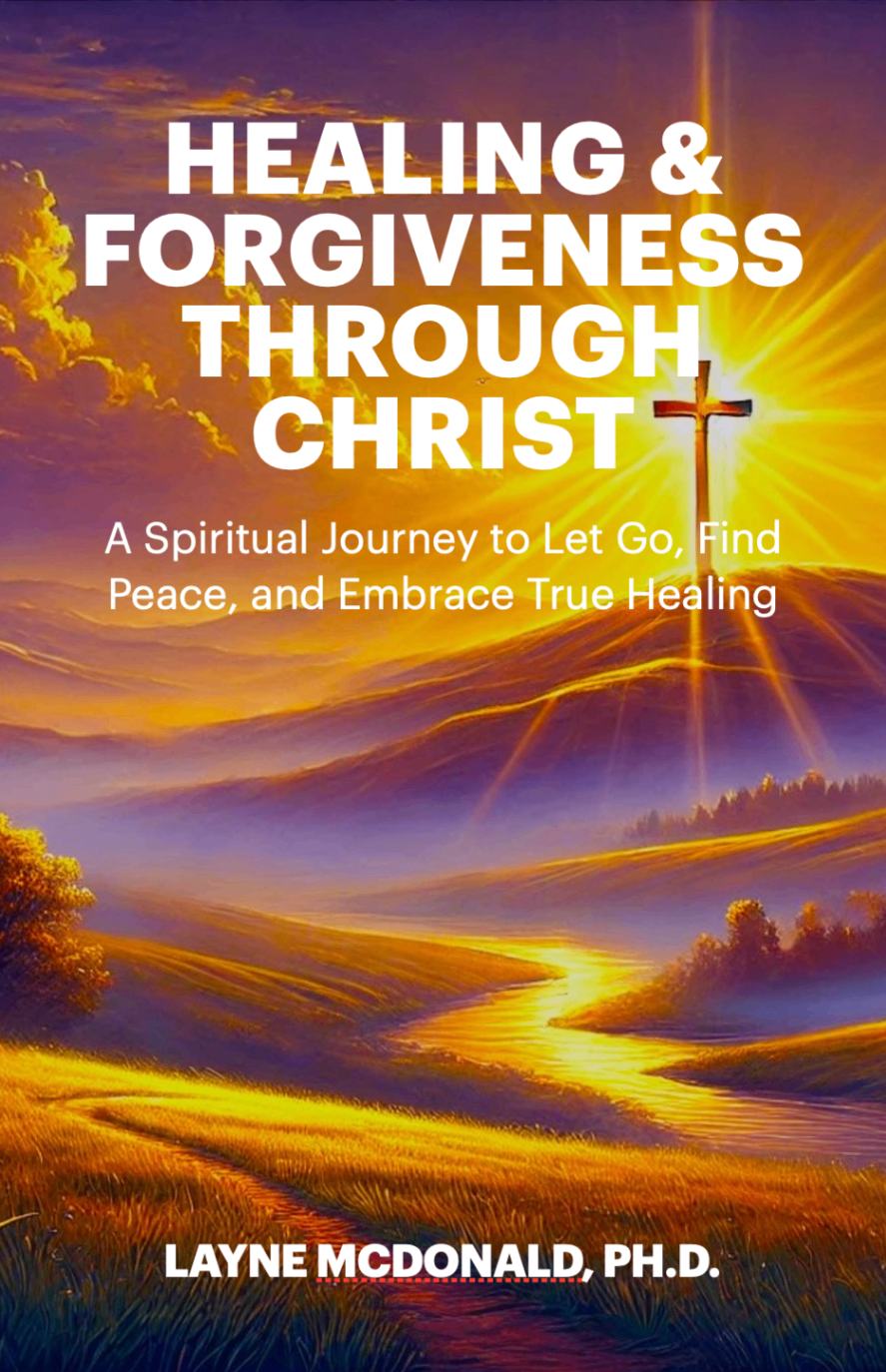The Proven Christian Healing Framework: Stop Struggling with Forgiveness in 3 Simple Steps
- Layne McDonald
- Nov 7, 2025
- 6 min read
You've been carrying that hurt for months, maybe years. Every time you think you've moved past it, the memory resurfaces like a splinter you can't quite remove. You've prayed about it, talked to friends, even tried to "just get over it," but the pain keeps showing up uninvited. What if I told you that forgiveness doesn't have to be this complicated wrestling match you keep losing?
Here's what most people get wrong about forgiveness: they think it's supposed to happen all at once, like flipping a light switch. They believe they need to feel warm and fuzzy about the person who hurt them before they can truly forgive. That's not biblical forgiveness, that's emotional manipulation disguised as spirituality.
The truth is, forgiveness is a decision first and a feeling second. It's a process that can be learned, practiced, and mastered using a proven framework that countless believers have used to break free from the chains of unforgiveness.
Why Traditional Forgiveness Advice Falls Short
Most forgiveness advice sounds something like this: "Just pray about it and let it go." While prayer is absolutely essential, this oversimplified approach leaves people feeling like failures when they can't just "let it go" on command.
The problem isn't your heart, it's your approach. Forgiveness without a framework is like trying to build a house without blueprints. You might get somewhere, but you'll waste a lot of time and energy in the process.
Biblical forgiveness operates on three levels: • Your will (the decision to forgive) • Your emotions (the healing of your heart) • Your relationship (the restoration of connection)
Most people try to tackle all three simultaneously and end up frustrated when their emotions don't immediately align with their decision. The framework I'm about to share separates these elements and tackles them in the right order.

Step 1: Admit There Is a Problem
This might sound obvious, but you'd be surprised how many believers skip this crucial first step. Admitting there's a problem means getting brutally honest about the hurt, anger, and bitterness you're carrying without denying, minimizing, or spiritualizing it away.
Here's what this step looks like in practice:
• Name the offense specifically - Don't just say "they hurt me." Say exactly what they did and how it affected you. • Acknowledge your emotions - Whether it's anger, disappointment, betrayal, or something else, give it a name. • Stop making excuses for the other person - This isn't about understanding their motives; it's about acknowledging the impact of their actions. • Recognize the weight you've been carrying - Notice how this unforgiveness has been affecting your peace, relationships, and spiritual growth.
Ephesians 4:31-32 tells us to "get rid of all bitterness, rage, anger, harsh words, and slander," but you can't get rid of something you won't acknowledge exists. This step isn't about wallowing in the pain, it's about honest assessment.
Many Christians feel guilty about this step because they think acknowledging hurt means they're not being "Christ-like." That's not true. Jesus himself acknowledged pain and injustice. He wept over Jerusalem, felt frustrated with his disciples, and called out hypocrisy when he saw it. Honesty about harm isn't unspiritual, it's the foundation of genuine healing.

Step 2: Pray and Release the Pain
Once you've honestly acknowledged the problem, it's time to take your decision to forgive directly to God through prayer. This step is where the supernatural work of forgiveness begins.
This isn't a casual "God, help me forgive" prayer. This is a specific, intentional act of surrender where you:
• Make a conscious decision to forgive - Say it out loud: "I choose to forgive [name] for [specific offense]." • Release the offense to God - Hand over your right to revenge, your desire for the other person to suffer, and your need for them to acknowledge the wrong. • Ask God to heal your heart - Request supernatural healing for the emotions and memories associated with the hurt. • Pray for the other person's blessing - This might feel impossible at first, but it's a powerful step toward your own freedom.
Mark 11:25 teaches us that "when you are praying, first forgive anyone you are holding a grudge against, so that your Father in heaven will forgive your sins, too." Notice that forgiveness happens during prayer, not after we feel better about the situation.
Here's a sample prayer that many have found helpful:
"God, I acknowledge that [name] hurt me by [specific action]. I've been carrying anger and pain about this, and I don't want to anymore. Right now, I choose to forgive them. I release my right to revenge and my need for them to pay for what they did. I ask You to heal my heart from this wound and to bless [name]. Help me to see them through Your eyes. In Jesus' name, Amen."
The power in this step comes from recognizing that forgiveness is ultimately between you and God. You're not doing the other person a favor, you're being obedient to Christ's command and positioning yourself to receive God's healing power.
Step 3: Remain Focused
Here's where most people stumble: they think forgiveness is a one-time event. In reality, forgiveness is an ongoing practice, especially for deep wounds. When the memory of the offense resurfaces (and it will), you must consciously choose forgiveness again.
This step involves:
• Recognizing when unforgiveness tries to return - Pay attention to your thought patterns, emotions, and reactions. • Immediately redirecting your thoughts - When you catch yourself rehearsing the hurt, stop and declare your choice to forgive again. • Refusing to entertain revenge fantasies - Don't let your mind wander into "what if" scenarios where you get back at the other person. • Continuing to pray for the person's blessing - This keeps your heart soft and aligned with God's heart.
Jesus taught through Peter's question that forgiveness should be extended "seventy times seven", meaning continuously and without limit. When you find yourself replaying the offense or feeling the familiar sting of resentment, pause and declare: "No, in the name of Jesus, I forgive that person again. I thank You, Lord, that I have received forgiveness freely and I give forgiveness freely."
This isn't about pretending the hurt never happened or putting yourself back in harm's way. It's about refusing to let past wounds control your present peace.

Why This Framework Creates Lasting Freedom
This three-step framework works because it separates the decision to forgive (which is within your control through your will) from the emotional healing (which requires God's ongoing work). You don't need to feel forgiving to take these steps: you simply need to be obedient to Christ's command.
The beautiful truth is that as you remain faithful to this process, God works to heal your heart from the inside out. Emotions follow decisions, not the other way around. Many people discover that after consistently choosing forgiveness through this framework, they genuinely begin to feel compassion for the person who hurt them.
This doesn't mean the relationship automatically returns to what it was before. Forgiveness doesn't eliminate consequences or automatically restore trust. Those are separate conversations that may or may not happen depending on the situation and the other person's response.
Moving Forward in Freedom
Forgiveness isn't just about the past: it's about your future. Every day you carry unforgiveness is a day you forfeit peace, joy, and spiritual growth. The enemy of your soul wants to keep you trapped in bitterness because he knows it blocks your effectiveness in God's kingdom.
But God has so much more for you. He wants to turn your wounds into wisdom, your pain into purpose, and your mess into your message. The forgiveness framework isn't just about letting others off the hook: it's about getting yourself off the hook of carrying burdens that were never meant to be yours.
If you're ready to stop struggling with forgiveness and start walking in the freedom Christ died to give you, don't wait for the "right" feeling. Start with the right decision. Work through these three steps, and trust God to do what only He can do: heal your heart completely.
Ready to dive deeper into your healing journey? Discover more transformative insights in my book "Healing & Forgiveness Through Christ," where I walk you through additional biblical strategies for emotional and spiritual restoration. You can also explore our coaching programs designed specifically for believers ready to break free from past hurts and step into their God-given purpose. Visit laynemcdonald.com to learn more about our mentorship opportunities, workshops, and faith-based resources that will support you every step of the way toward complete healing and restoration.

$50
Product Title
Product Details goes here with the simple product description and more information can be seen by clicking the see more button. Product Details goes here with the simple product description and more information can be seen by clicking the see more button

$50
Product Title
Product Details goes here with the simple product description and more information can be seen by clicking the see more button. Product Details goes here with the simple product description and more information can be seen by clicking the see more button.

$50
Product Title
Product Details goes here with the simple product description and more information can be seen by clicking the see more button. Product Details goes here with the simple product description and more information can be seen by clicking the see more button.
Comments